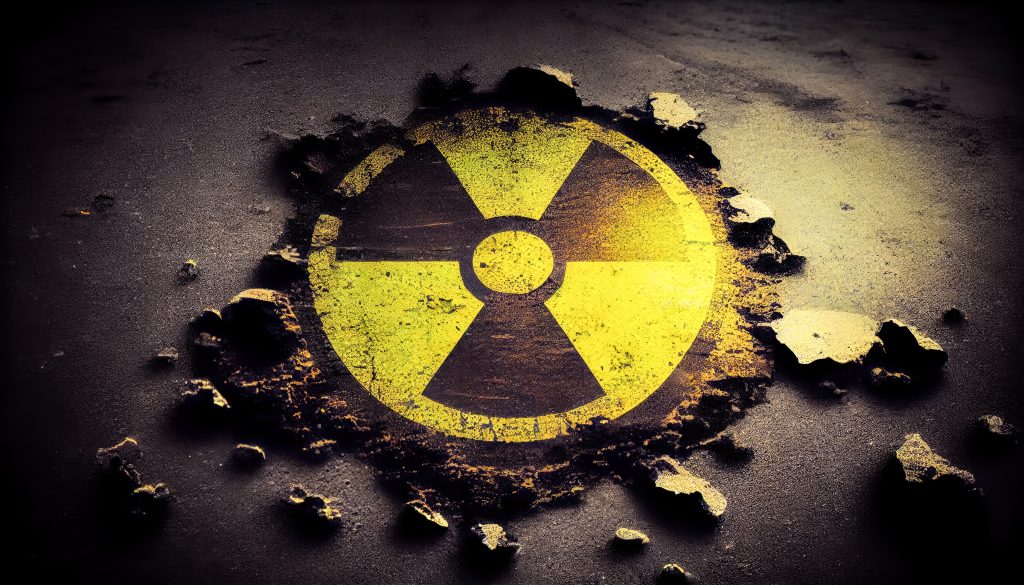You may be aware of its immense energy-generating capabilities, but have you considered the potential risks it poses? From catastrophic events like Fukushima and Chernobyl to the detrimental impact on human health and the environment, nuclear fission presents serious concerns. The dangers of radiation exposure and its link to long-term health issues, the non-renewable nature of nuclear fission, and its potential for weapon development are just a few aspects we will explore. By understanding these disadvantages, a clearer evaluation of nuclear fission’s role in our energy landscape and the search for alternative power sources can be made.
Environmental Impact
Nuclear fission, despite its advantages in terms of energy production, poses significant environmental concerns that cannot be ignored. One of the main drawbacks of nuclear fission is the issue of nuclear waste contamination. The radioactive waste produced during the fission process is highly toxic and remains dangerous for thousands of years. Improper management and disposal of this waste can lead to environmental contamination, posing a risk to ecosystems and human health.
Ecosystem disruption is another environmental impact of nuclear fission. The construction and operation of nuclear power plants can result in the destruction of natural habitats and the displacement of wildlife. Additionally, accidents like the Fukushima and Chernobyl disasters have demonstrated the catastrophic effects that nuclear accidents can have on ecosystems, causing long-term damage to flora and fauna.
Public perception is also a significant concern when it comes to nuclear fission. The risks associated with nuclear power plants and the potential for accidents have led to public fear and opposition. This negative perception can hinder the development and expansion of nuclear energy as a viable alternative to fossil fuels.
Furthermore, the economic costs of nuclear fission must be taken into account. The construction and maintenance of nuclear power plants require significant investments, and the long-term management of nuclear waste adds to the financial burden. These costs, coupled with the potential for accidents and their associated cleanup and compensation expenses, make nuclear fission a costly energy option.
Considering these environmental concerns, it is crucial to explore alternative energy solutions that can mitigate the risks associated with nuclear fission. Renewable energy sources such as solar, wind, and hydroelectric power offer cleaner and safer alternatives that do not produce radioactive waste or pose the same risks to ecosystems. By investing in these alternative energy solutions, we can reduce our reliance on nuclear fission and move towards a more sustainable future.
Health Risks
The potential health risks associated with nuclear fission cannot be overlooked. One of the main concerns is radiation exposure, which poses a significant threat to human health. Exposure to high levels of radiation can increase the risk of developing cancer. The ionizing radiation emitted during nuclear fission reactions can damage the DNA in cells, leading to the uncontrolled growth of cancerous cells. Moreover, radiation exposure can also cause organ damage, particularly to sensitive organs such as the heart, lungs, bowel, and bladder.
To mitigate these risks, protective measures must be implemented. Barriers like lead, water, and concrete can provide shielding against radiation, reducing the amount of exposure. Additionally, strict safety protocols and regulations should be in place to ensure the safe operation of nuclear facilities and prevent accidents that could result in radiation leaks. Regular monitoring and testing of radiation levels in the environment are crucial to assess potential risks and take appropriate actions to protect public health.
The health implications of nuclear fission extend beyond individual exposure. Accidents or mishandling of radioactive waste can have long-lasting public health consequences. Proper management and disposal of radioactive waste are essential to prevent contamination of the environment and minimize the risks to both current and future generations. Overall, understanding and addressing the health risks associated with nuclear fission are of utmost importance to ensure the safe and sustainable use of this energy source.
Radioactive Waste Disposal
Proper disposal of radioactive waste is a critical aspect of ensuring the safe and sustainable use of nuclear fission as an energy source. Radioactive waste is generated during the operation and decommissioning of nuclear power plants, as well as during the reprocessing of spent nuclear fuel. It consists of materials that remain radioactive and hazardous for thousands of years. The disposal of this waste requires careful consideration of cost implications, public perception, regulatory frameworks, technological advancements, and international cooperation.
The cost implications of radioactive waste disposal are significant. The management and storage of radioactive waste require long-term planning and investment. The construction and maintenance of secure storage facilities, such as deep geological repositories, can be expensive. Additionally, the transportation of radioactive waste to these facilities must be conducted with utmost care to ensure the safety of the public and the environment.
Public perception of radioactive waste disposal is another important factor. The public is concerned about the potential risks associated with the transportation, storage, and long-term containment of radioactive waste. Addressing these concerns and building public trust is crucial for the acceptance and support of nuclear fission as an energy source.
Regulatory frameworks play a vital role in ensuring the safe and environmentally sound disposal of radioactive waste. Robust regulations are necessary to establish stringent standards for waste management, transportation, and storage. These regulations must be continuously updated and enforced to keep pace with technological advancements and scientific understanding.
Technological advancements can greatly improve the disposal of radioactive waste. Research and development efforts are focused on developing advanced waste treatment and disposal technologies that can reduce the volume, toxicity, and long-term hazard of radioactive waste. These advancements can enhance the safety and efficiency of waste disposal practices.
International cooperation is essential for the effective management of radioactive waste. Given the transboundary nature of the issue, collaboration among countries is necessary to establish common standards, share best practices, and facilitate the safe and secure disposal of radioactive waste. International organizations, such as the International Atomic Energy Agency (IAEA), play a crucial role in promoting cooperation and knowledge sharing in this area.
Non-renewable Resource Dependency
One of the significant challenges associated with nuclear fission is the dependency on non-renewable resources. Nuclear reactors rely on a finite supply of uranium as fuel, which raises concerns about energy sustainability and resource depletion. To understand the implications of this dependency, let’s analyze the geopolitical, economic, and technological aspects in the table below:
| Geopolitical Implications | Economic Costs | Technological Advancements |
|---|---|---|
| Countries with limited uranium deposits may become dependent on importing this resource, which can affect their energy security. | The extraction and processing of uranium ore involve significant costs, including exploration, mining, and transportation. Additionally, the construction and maintenance of nuclear power plants require substantial investments. | Ongoing research and development are necessary to improve fuel efficiency, reduce waste production, and explore alternative fuel sources for nuclear reactors. Technological advancements can also contribute to the safe disposal of radioactive waste. |
The geopolitical implications highlight the potential vulnerability of countries that rely heavily on imported uranium. This dependency can have long-term consequences for their energy security and geopolitical relationships. Furthermore, the economic costs associated with uranium extraction and processing, as well as the construction and maintenance of nuclear power plants, should be considered in evaluating the overall viability of nuclear fission as an energy source.
To address these challenges, continuous technological advancements are crucial. Research and development efforts focused on improving fuel efficiency, reducing waste production, and exploring alternative fuel sources can contribute to the sustainability of nuclear energy. Additionally, advancements in waste disposal technologies are necessary to ensure the safe management of radioactive waste.
Potential for Nuclear Accidents
With the potential for nuclear accidents, it is crucial to assess the risks and safety measures associated with nuclear fission as an energy source. Nuclear accidents can have catastrophic consequences, as demonstrated by incidents like Fukushima and Chernobyl. To mitigate the risks, extensive nuclear safety measures are in place, including emergency response plans and stringent regulations.
One of the key factors in preventing nuclear accidents is the continuous improvement of technological advancements. These advancements enable the development of safer reactor designs and more robust safety systems. Risk assessment plays a vital role in identifying potential hazards and implementing appropriate preventive measures.
Public perception also plays a significant role in nuclear safety. Public trust and confidence in the industry are essential for maintaining safety standards. Transparent communication, education, and engagement with the public are crucial in addressing concerns and dispelling misconceptions.
Emergency response plans are critical in minimizing the impact of a nuclear accident. These plans outline procedures for evacuation, decontamination, and medical treatment. Regular drills and training exercises ensure the readiness of personnel and enhance response capabilities.
Nuclear Weapon Proliferation
Nuclear weapon proliferation poses a significant threat to global security and stability. It is essential to address the risks associated with the spread of nuclear weapons to ensure international security. The following are key concerns related to nuclear weapon proliferation:
- Nuclear Disarmament: The reduction and elimination of nuclear weapons are crucial for preventing their proliferation. Efforts should be made to promote nuclear disarmament globally.
- Safeguards Agreement: Implementing effective safeguards agreements is vital to prevent the diversion of nuclear materials and technologies for weapons purposes. These agreements ensure that countries use nuclear energy for peaceful purposes and comply with non-proliferation measures.
- Nuclear Non-Proliferation Treaty (NPT): The NPT is a cornerstone of nuclear weapons control. It aims to prevent the spread of nuclear weapons, promote disarmament, and facilitate the peaceful use of nuclear energy. Strengthening and enforcing the NPT is crucial to prevent nuclear weapon proliferation.
To address the risks of nuclear weapon proliferation, international cooperation, robust verification mechanisms, and strong non-proliferation regimes are essential. Promoting nuclear disarmament, implementing safeguards agreements, and upholding the NPT are crucial steps towards achieving global security and stability.
Long-term Planning and Management Challenges
To effectively address the risks of nuclear weapon proliferation and ensure international security, it is imperative to carefully plan and manage the long-term challenges associated with nuclear energy. These challenges encompass various aspects, including waste management, sustainability concerns, public perception, and economic implications.
One of the key planning challenges in nuclear energy is the management of radioactive waste. Nuclear fission produces highly toxic and long-lasting waste products that require proper disposal and storage for thousands of years. This poses significant technical and logistical challenges, as well as potential environmental and health risks.
Another planning challenge is addressing sustainability concerns. Nuclear energy relies on finite resources like uranium, which raises questions about the long-term viability and availability of these resources. Additionally, the construction and operation of nuclear power plants have environmental impacts, such as habitat disruption and water usage.
Public perception is also a critical factor in long-term planning and management. The perception of nuclear energy can impact its social acceptance and support, influencing policy decisions and investment. Public concerns about the safety and potential for accidents, as evidenced by incidents like Chernobyl and Fukushima, need to be addressed and mitigated.
Furthermore, long-term planning and management of nuclear energy have significant economic implications. The construction and maintenance of nuclear power plants require substantial financial resources. Additionally, the costs associated with waste management and decommissioning of nuclear facilities must be considered.
To navigate these challenges, comprehensive and well-informed planning is essential. This includes robust waste management strategies, investment in research and development for sustainable nuclear technologies, effective communication to address public concerns, and careful consideration of the economic implications. By proactively addressing these challenges, the full potential of nuclear energy can be realized while ensuring safety, sustainability, and public confidence.
| Planning Challenges | Waste Management |
|---|---|
| Sustainability Concerns | Public Perception |
| Economic Implications |





